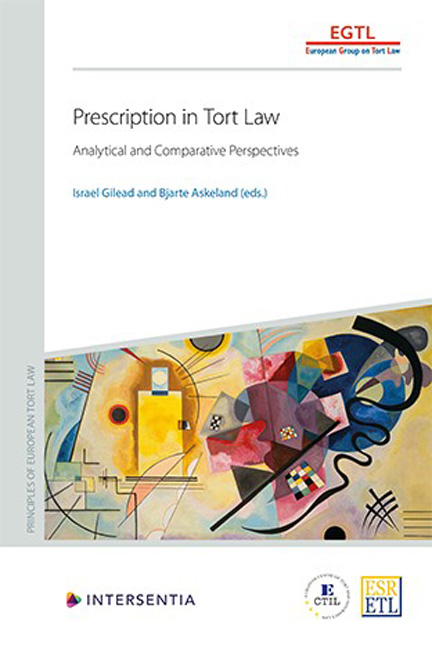Book contents
- Frontmatter
- Dedication
- Acknowledgements
- Contents
- List of Authors
- PART I THEORETICAL AND COMPARATIVE ANALYSES
- Analytical and Comparative Report
- Economic Analysis
- PART II PRESCRIPTION IN TORT LAW OUTLINED
- Case Scenarios
- Austria
- Belgium
- Czech Republic
- England and Wales
- France
- Germany
- Greece
- Italy
- The Netherlands
- Norway
- Poland
- South Africa
- Spain
- Switzerland
- United States
- European Union
- Appendix: Questionnaire
- About the Editors
Switzerland
Published online by Cambridge University Press: 22 December 2020
- Frontmatter
- Dedication
- Acknowledgements
- Contents
- List of Authors
- PART I THEORETICAL AND COMPARATIVE ANALYSES
- Analytical and Comparative Report
- Economic Analysis
- PART II PRESCRIPTION IN TORT LAW OUTLINED
- Case Scenarios
- Austria
- Belgium
- Czech Republic
- England and Wales
- France
- Germany
- Greece
- Italy
- The Netherlands
- Norway
- Poland
- South Africa
- Spain
- Switzerland
- United States
- European Union
- Appendix: Questionnaire
- About the Editors
Summary
INTRODUCTION
Before the first Swiss Code of Obligations was draft ed in the late 19th century, civil law was regulated by cantonal law. Prescription rules differed from canton to canton, depending on the influences (eg of the French Code Civil) they had been exposed to. It must also be noted that some Swiss legal scholars provided for an important advancement of the Swiss civil law during the 19th century. The first prescription rules at federal level were those found in the first Swiss Code of Obligations of 1881 that was later replaced by the Swiss Code of Obligations of 1911 which is still in force today. They are to be seen as the result of a mixture of rules and ideas that were received from abroad and rules born out of domestic ideas and concepts at cantonal and federal level. Consequently, Swiss prescription law resembles the law of its European neighbours (especially France and Germany) but also exhibits some coining features that are genuinely ‘Swiss made‘.
Today, the sedes materiae of prescription law is still embedded in the Swiss Code of Obligation of 1911 (arts 60, 67 and 127– 142). In the last 50 years, numerous special legislative acts containing liability and prescription rules came into force, so today's prescription law in Swiss civil law is highly dispersed and heterogeneous. Endeavours to reform and modernise the prescription law were repeatedly undertaken in the last decades but failed. The latest legislative draft containing a revision of the prescription rules was (temporarily) turned down by the Legal Affairs Committee of the National Council on 4 September 2017. On 15 June 2018, however, the federal Parliament eventually adopted revised prescription rules of arts 60, 67 and 127 et seq. CO which entered into force on 1 January 2020.
DEFINITION OF PRESCRIPTION
Under Swiss civil law, prescription (or statute of limitation) is a legal institution that prevents the creditor from enforcing an alleged right against the debtor because of the running of a specified period of time on a specific right. Prescription does not extinguish the right; however, it provides the debtor with a substantive defence that prevents the creditor from enforcing the right. Article 142 CO provides for an important procedural rule: The court may not consider the prescription ex officio .
- Type
- Chapter
- Information
- Prescription in Tort LawAnalytical and Comparative Perspectives, pp. 621 - 648Publisher: IntersentiaPrint publication year: 2020



